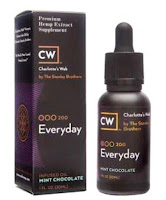Precedential No.24: Finding a Per Se Violation of the FDCA, TTAB Affirms Unlawful Use Refusal of "CW" for Hemp Oil Extracts
Finding that use of the mark CW for "Hemp oil extracts sold as an integral component of dietary and nutritional supplements" constitutes a per se violation of the Food, Drug & Cosmetics Act ("FDCA"), the Board affirmed the USPTO's refusal to register the mark under Sections 1, 2, and 45 of the Trademark Act. The Board declined to review a second refusal based on an alleged per se violation of the federal Controlled Substances Act (“CSA”). In re Stanley Brothers Social Enterprises, LLC, 2020 U.S.P.Q.2d 10658 (T.T.A.B.2020) [precedential] (Opinion by Judge Frances Wolfson).
The Board has consistently held that "to qualify for a federal … registration, the use of a mark in commerce must be ‘lawful.’” PharmaCann, 123 USPQ2d at 1123 (quoting In re JJ206, LLC, 120 USPQ 1568, 1569 (TTAB 2016) and In re Brown, 119 USPQ2d 1350, 1351 (TTAB 2016)). The USPTO presumes that the use of a mark in commerce is lawful unless the application record indicates a violation of federal law. In Brown, 119 USPQ2d at 1351, the Board summarized the applicable test:
[R]egistration generally will not be refused based on unlawful use in commerce unless either (1) a violation of federal law is indicated by the application record or other evidence, such as when a court or a federal agency responsible for overseeing activity in which the applicant is involved, and which activity is relevant to its application, has issued a finding of noncompliance under the relevant statute or regulation, or (2) when the applicant's application-relevant activities involve a per se violation of a federal law.
The record evidence showed that Applicant Stanley Brothers' goods contain cannabidiol (CBD), an extract of the cannabis plant that is regulated under the FDCA as a drug. The FDCA prohibits “[t]he introduction or delivery for introduction into interstate commerce of any food to which has been added … a drug or biological product for which substantial clinical investigations have been instituted and for which the existence of such investigations has been made public ….” 21 U.S.C. § 331(ll). Examining Attorney Jeffrey J. Look maintained that Applicant’s "hemp oil extracts" are food to which CBD has been added, and that CBD was the subject of clinical investigations during prosecution of the involved application. The Board noted that under 21 U.S.C. § 321(ff) “a dietary supplement shall be deemed to be a food within the meaning of this chapter.”
Stanley Brothers contended that (1) the 2014 Farm Bill's Industrial Hemp Provision exempts it from this portion of the FDCA; (2) dietary supplements are not "food," and (3) CBD falls within an exception to the FDCA for drugs or biological products "marketed in food ... before any substantial clinical investigations involving the drug or the biological product have been instituted." 21 U.S.C. Section 331(ll)(1). The Board disagreed, as follows.
As to point (1), the Industrial Hemp Provision is a limitation on the Controlled Substances Act in some circumstances, but it does not override the FDCA's prohibition of offering “food to which has been added … a drug or biological product for which substantial clinical investigations have been instituted and for which the existence of such investigations has been made public.”
The Industrial Hemp Provision permits authorized entities to “grow or cultivate industrial hemp” under certain circumstances, but it does not permit the distribution or sale of CBD in food when CBD is the subject of clinical investigation, even if the CBD is derived from industrial hemp which falls outside the CSA.
Or as the examining attorney stated: "In other words, it is not the industrial hemp to which the FDCA applies, but the CBD cannabinoid oil extracted from the hemp."
As to point (2), applicant's hemp oil extracts fall within the FDCA's definition of food, since they are recommended for use in beverages, are offered in "multiple flavors," and are promoted as "dietary supplements."
As to point (3), the CBD in applicant's products qualify as a “drug or biological product for which substantial clinical investigations have been instituted and for which the existence of such investigations has been made public” under 21 U.S.C. § 331(ll). The Food and Drug Administration has stated that CBD is under "substantial clinical investigations." Applicant's assertion that its goods were marketed before such investigations were instituted was unsupported by any probative evidence.
Concluding that the USPTO established a per se violation of the FDCA, the Board affirmed the refusal to register. Despite a lengthy discussion of the CSA and the Farm Bills, the Board declined to reach the unlawful use refusal based on violation of the CSA.
Read comments and post your comment here.
TTABlogger comment: More bad trademark news for the cannabis industry.
Text Copyright John L. Welch 2020.





1 Comments:
As a person coming from a jurisdiction where the acquisition of trademark right is based on registration rather than first-to-use, the lawful use requirement is quite tricky. On the other hand, this is the very reason making this reading interesting...
Post a Comment
<< Home